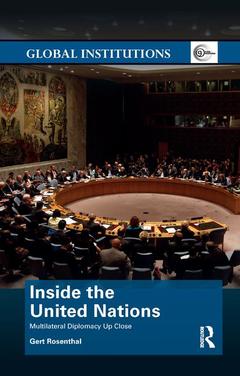Inside the United Nations Multilateral Diplomacy Up Close Global Institutions Series

Inside the United Nations illustrates some of the parameters surrounding consensus-building at the United Nations, seeking to provide new insights beyond what is already known. The author spent twelve years as P.R of Guatemala at the UN, offering him privileged observatories in all three of the main inter-governmental organs: the General Assembly, the Economic and Social Council, and the Security Council.
In this book Rosenthal focuses on six case studies that offer the breadth and scope of what the UN does, and illustrate some of the main elements of the dynamics of consensus-building, providing concrete examples of the ingredients that shape decision-making in a multilateral setting. The chapters:
- cover the origin, preparation, and outcome of two successful international conferences: the 2000 Millennium Summit and the 2002 International Conference on Financing for Development;
- look at the 2000 negotiation on the scale of assessments to finance the UN?s budget in the General Assembly?s fifth committee (2000-2001);
- focus on the relevance of the Economic and Social Council;
- consider the internal politics involved in vying for elected posts in intergovernmental bodies by focusing on the campaign to be elected to the Security Council between Guatemala and Venezuela in 2006;
- reflect on the peculiarities of decision-making in the Security Council.
Providing an insider?s view on the UN and exploring different facets of multilateral diplomacy at the UN, this book will be of great use and interest to scholars of international relations as well as the diplomatic community.
Preface
Introduction
1. The 2000 Millennium Declaration: A General Assembly Summit with far-reaching consequences
2. The 2002 International Conference on Financing for Development
3. The 2000-2001 battle over the scale of assessments in the Fifth Committee
4. ECOSOC in 2003: A principal organ in search of its identity
5. Electoral politics at the United Nations: A contested election in 2006
6. The Security Council in 2012-2013: The perspective of small states
7. An overview: Some lessons learned
Suggested reading
Gert Rosenthal is a Guatemalan economist. He did both his undergraduate and graduate studies at the University of California at Berkeley. He alternated his career between public service in Guatemala and in international organizations. On the former, he was, among other posts Secretary-General of the National Planning and Budgetary Secretariat. On the latter, he worked for the Secretariat of the Central American Common Market before joining the United Nations Economic Commission for Latin America and the Caribbean (ECLAC) where he served as its Executive Secretary from 1988 to 1997. After retiring from the UN secretariat he rejoined his government and served, first, as Permanent Representative of Guatemala to the United Nations, then as Foreign Minister of Guatemala, followed by a second tour of duty to the UN to lead the Guatemalan delegation to the Security Council. His last activity with the United Nations was as Chair of the Advisory Group of Experts for the 2015 review of the organization’s peacebuilding architecture.
Date de parution : 01-2019
13.8x21.6 cm
Disponible chez l'éditeur (délai d'approvisionnement : 14 jours).
Prix indicatif 53,83 €
Ajouter au panierDate de parution : 03-2017
13.8x21.6 cm
Mots-clés :
CARICOM Country; ECOSOC’s Work; Security Council; Diego Cordovez; General Assembly; Addis Ababa Action Agenda; Global Institutions; NAM; Weiss; Principal Intergovernmental Organs; Diplomacy; International Monetary Fund; High Level Political Forum; Multilateral Diplomacy; Harri Holkeri; Consensus Candidate; Elected Members; Theo Ben Gurirab; Regular Budget; Ambassador Holbrooke; High Level Segment; P5 Country; Inter-governmental Organs; Monterrey Conference; Peacekeeping Scale; Russian Federation; Preparatory Committee; Heidemarie Wieczorek Zeul; Major United Nations Conferences; Peacebuilding Fund



